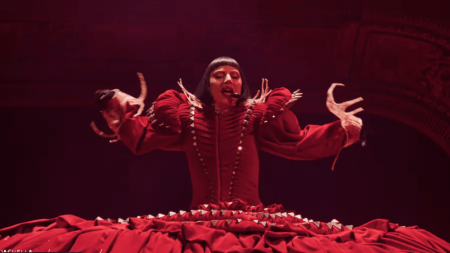Britney Spears’ ex-husband Sam Asghari recently stepped into the spotlight to defend the pop icon’s controversial Instagram videos, where she was seen dancing with knives. In a conversation on the Viall Files podcast, Asghari praised Spears as a “genius artist,” emphasizing her creativity and unique expression. He even compared her to the late Michael Jackson, noting that both artists have had “genius ideas that somebody else wouldn’t have.” Asghari, who was married to Spears from 2022 to 2024, made it clear that he believes in giving her the freedom to express herself, whether through dance or social media. “I’m not someone that [would say], ‘Let me take your phone from you and not allow you to do anything and restrict you from posting your own content,’” he said. His comments reflect a deep respect for her artistry and a belief in her right to self-expression, even when her choices spark concern or confusion.
Asghari also addressed Spears’ highly publicized conservatorship, which was controlled by her estranged father, Jamie Spears, for 13 years before its termination in 2021. He acknowledged the emotional toll of having her autonomy stripped away, stating, “When you take away the ability to make art, express yourself, I’m not going to be the one that’s gonna stop anybody from posting what they want — especially if dance is the way you express yourself.” His words highlight the importance of artistic freedom and the impact that restrictive control can have on a person’s well-being. Despite his own differences with Jamie Spears — whom he once called a “total d–k” — Asghari shared that he maintained a respectful relationship with him, striving to understand all perspectives and protect Spears throughout their marriage. His nuanced approach to their blended family dynamics shows a commitment to respect and empathy, even in challenging situations.
The conversation comes after Spears sparked worries among fans and those close to her in 2023 when she posted videos of herself dancing with butcher knives. In the clips, Spears, now 43, could be seen twirling and spinning in her living room, knives in hand, as her dogs scurried away in the background. While she later clarified in a caption that the blades were “NOT real,” subsequent videos showed her with a bandage on her arm and cuts on her thigh, leaving many questioning her well-being. The posts caught the attention of authorities, with the Ventura County Sheriff’s Office revealing that they had received a call from “somebody close to Britney” who was “really concerned for her mental well-being” after seeing the footage. Police responded to her $7.4 million home in Thousand Oaks, California, but were assured by security through an intercom that Spears was “fine” and left without further action.
Spears later addressed the incident on Instagram, calling the welfare check a “joke” and writing, “It’s about power for cops.” Her response underscores her ongoing frustration with systemic control and public scrutiny, themes that have been central to her life since the conservatorship. While some critics have raised questions about her judgment, others, like Asghari, argue that her unconventional behavior is part of her artistic process and a testament to her unique spirit. As someone who knows her intimately, Asghari’s defense offers a rare glimpse into Spears’ inner world, where creativity and expression often take priority over external expectations.
The situation also highlights the complexities of Spears’ life in the public eye. Her Instagram posts, whether they’re dance videos, reflective captions, or cryptic messages, are subject to intense analysis. For fans and tabloids alike, every update from Spears becomes a puzzle piece in the larger narrative of her life. While some view her posts as a window into her mental health, others, like Asghari, see them as a celebration of her individuality and resilience. This duality — between concern and admiration — reflects the broader cultural fascination with Spears, a woman who has been both a pop icon and a symbol of personal and professional struggle.
Ultimately, Asghari’s comments serve as a reminder of the challenges Spears has faced and her enduring strength. His admiration for her creativity and his respect for her autonomy highlight the importance of supporting artists, even when their choices don’t align with societal norms. Spears’ journey, marked by both triumphs and trials, continues to inspire conversation about mental health, artistic expression, and the complexities of fame. As she navigates this new chapter of her life, Spears remains a figure of intrigue and admiration, proving that her spirit and creativity are as unbreakable as ever.









